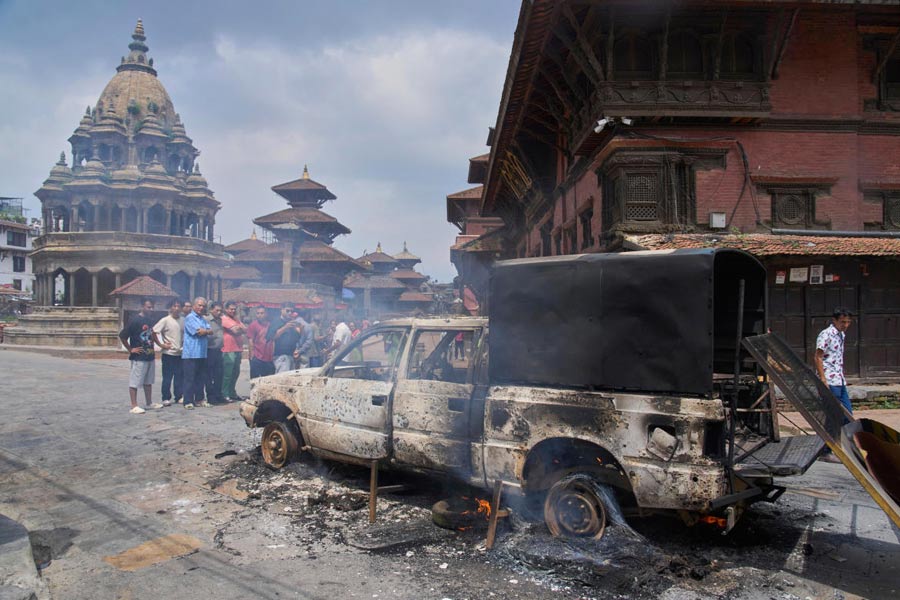Security has been intensified along the Indo-Nepal border as violent youth-led protests continue to rock the Himalayan nation following a controversial ban on social media platforms.
The Sashastra Seema Bal (SSB), which guards the 1,751-km-long open border, has stepped up vigil across all posts and vulnerable points, while police forces in Uttar Pradesh’s border districts have deployed drones, patrol units and surveillance devices to prevent any spillover of unrest.
At least 19 people were killed and over 250 injured after security forces in Nepal opened fire on demonstrators on Monday.
On Tuesday, Prime Minister KP Sharma Oli resigned after protesters stormed Parliament in Kathmandu and vandalised the residences of several political leaders.
Though the government revoked the ban on WhatsApp, Facebook, Messenger and 23 other platforms late Monday, protests—led largely by Gen Z—have continued with demands for action against corruption.
Superintendent of Police Vikas Kumar in Balrampur said, “Additional forces have been deployed at 22 outposts of the Sashastra Seema Bal (SSB) along the border, while police stations in five border areas are keeping surveillance through drone cameras.”
He added that all agencies have been instructed to maintain strict monitoring and personnel along the 85-km frontier have been put on high alert.
In Bahraich, the SSB has strengthened patrolling and checks along highways, village tracks and forest routes.
Police teams and SSB jawans are conducting joint patrols, while ‘Operation Kavach’ committees in the region have been asked to stay active and keep a close watch on cross-border movement.
“While only sporadic protests were reported near Nepalgunj, we have strengthened vigilance on our side. Patrolling has been intensified and monitoring devices like face-recognition systems and automatic number plate readers are being closely used,” said Ganga Singh Udawat, Commandant of SSB’s 42nd battalion.
In Maharajganj, security has been tightened at the Sonauli border with joint police-SSB vigil.
Superintendent of Police Somendra Meena said, “Full vigilance is being maintained on the border. Instructions have been issued to all station house officers to monitor every activity, and security forces are ready to deal with any situation.”
Authorities in Lakhimpur Kheri and Pilibhit also reported heightened alert at Gaurifanta and other entry points.
District Magistrate Gyanendra Singh of Pilibhit said, “There are deep trade and family ties between Pilibhit and Nepal. Many families here have residences and businesses across the border. As of now, no restrictions on movement have been imposed, but we are keeping a close watch on developments.”
The India-Nepal border is approximately 1,751 kilometers long. This border is shared with five Indian states: Uttarakhand, Uttar Pradesh, Bihar, West Bengal, and Sikkim.
Local residents said the internet blackout in Nepal disrupted cross-border communication.
Ranipur advocate Gyas Ahmed said, “We have many relatives in Nepal. Through the internet, we were able to remain in touch with them and check on their well-being. The ban created difficulties for us and added to our concerns amid the violent agitation.”
Akash Pandey, a resident of Sonouli in Maharajganj, said the ban hit people hard: “India and Nepal share the ‘roti-beti’ relationship, but calling across the border is very expensive. A one-minute call costs more than Rs 7. That’s why people rely on social media to connect with friends and relatives. Now, with the ban, many are distressed, especially families with daughters married across the border.”
Tourism too has taken a blow.
“Many Indian tourists who had crossed over are now stranded due to the curfew. We hope the government will arrange for their safe return,” said Srichan Gupta, a resident of Bharwan in Nepal.
Civil society groups, journalists and Nepal’s tech industry have strongly criticised the clampdown on digital platforms, warning that the move has disrupted education, businesses and cross-border families, and risks pushing the country backwards digitally.










